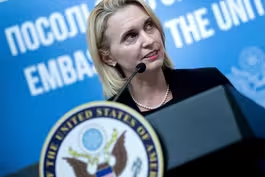
NOAA cuts make it harder to prepare for severe weather
Clip: 5/23/2025 | 6m 59sVideo has Closed Captions
How NOAA funding cuts could make it harder to predict and prepare for severe weather
For many people, Memorial Day weekend is the unofficial start of summer. But along the Atlantic and Gulf Coasts, it also means the start of hurricane season is nearly here. This particular hurricane season comes at a moment when NOAA and its agencies are being cut and facing their own turmoil. Science correspondent Miles O'Brien reports.
Problems playing video? | Closed Captioning Feedback
Problems playing video? | Closed Captioning Feedback
Major corporate funding for the PBS News Hour is provided by BDO, BNSF, Consumer Cellular, American Cruise Lines, and Raymond James. Funding for the PBS NewsHour Weekend is provided by...

NOAA cuts make it harder to prepare for severe weather
Clip: 5/23/2025 | 6m 59sVideo has Closed Captions
For many people, Memorial Day weekend is the unofficial start of summer. But along the Atlantic and Gulf Coasts, it also means the start of hurricane season is nearly here. This particular hurricane season comes at a moment when NOAA and its agencies are being cut and facing their own turmoil. Science correspondent Miles O'Brien reports.
Problems playing video? | Closed Captioning Feedback
How to Watch PBS News Hour
PBS News Hour is available to stream on pbs.org and the free PBS App, available on iPhone, Apple TV, Android TV, Android smartphones, Amazon Fire TV, Amazon Fire Tablet, Roku, Samsung Smart TV, and Vizio.
Providing Support for PBS.org
Learn Moreabout PBS online sponsorshipGEOFF BENNETT: For many people, Memorial Day weekend is the unofficial start of summer.
But along the Atlantic and Gulf Coasts, it also means the start of hurricane season is nearly here too.
And this particular hurricane season comes at a moment when NOAA and its agencies are being cut and facing their own turmoil.
Science correspondent Miles O'Brien has the story.
MILES O'BRIEN: Nearly 20 years after Hurricane Katrina ravaged the Gulf Coast, federal officials came to Gretna, Louisiana, to predict the U.S. is on the cusp of another above-normal hurricane season, between 13 and 19 named storms, six to 10 hurricanes, three to five of them major.
National Weather Service Director Ken Graham did not utter the word climate, now scrubbed from the federal lexicon, and yet still made clear the main culprit.
KEN GRAHAM, Director, National Hurricane Center: When you have a planet that's warmer, you look at the ocean temperatures could be impacted by that.
Warm sea surface temperature is probably the number one contributor to the whole thing.
MILES O'BRIEN: A lot has changed since Katrina.
Forecasters now issue an outlook for global tropical storms three weeks in advance.
Hurricane hunter aircraft are flying with new experimental radars able to collect data on the ocean waves and the wind.
And there are improved models for predicting precipitation and the rapid intensification of storms.
KEN GRAHAM: The modeling has never been better.
Our service has never been better.
Our ability to serve this country has never been better, and it will be this season as well.
MILES O'BRIEN: And yet the Weather Service and its parent organization, the National Oceanic and Atmospheric Administration, are facing an uncertain financial forecast.
The Trump federal spending overview, known as the skinny budget, released by the White House on May 2, calls for a 24 percent cut to NOAA's budget.
The Department of Government Efficiency terminated more than 800 NOAA employees, raising concerns about the frequency of essential forecasting tasks like launching weather balloons.
And the science budget is hit even harder.
Trump proposes a 74 percent cut to the Office of Oceanic Research.
WALEED ABDALATI, University of Colorado Boulder: I think these numbers are very difficult to believe, frankly.
MILES O'BRIEN: Glaciologist and former NASA chief scientist Waleed Abdalati is the director of the Cooperative Institute for Research in Environmental Sciences, CIRES, a joint venture between NOAA and the University of Colorado Boulder.
WALEED ABDALATI: It's important to study climate change because it is a big driver of our environment, the environment in which we live now, the environment in which we're going to live a year from now and 10 years from now.
And understanding that enables us to anticipate what the future may look like.
If some challenges are coming, how do we head them off?
MILES O'BRIEN: At first, the Trump budget sought to eliminate all funding for climate, weather and ocean laboratories and cooperative institutes housed primarily at major research universities.
CIRES and 15 other cooperative institutes are strategically distributed across the country.
Collectively, they explore climate, weather, oceans, coasts, air quality, water resources, and disaster resilience.
The Cooperative Institute at the University of Miami is deploying drones and remote research vessels to improve hurricane forecasts.
In Boulder, Waleed Abdalati showed me some of the tools they have developed to predict how fires behave.
WALEED ABDALATI: But this is derived from satellite observations, coupling this with information on the ground, drought information, how much fuel is there for a fire, to really get at the dynamics and the ultimate implications.
NELS BJARKE, Western Water Assessment: Certainly, there are many places like Park City.
MILES O'BRIEN: That's what this team of CIRES scientists is focused on.
They manage the Western Water Assessment, one of 13 NOAA-funded teams across the country focused on climate adaptation.
They work closely with small agricultural and ranching communities, trying to cope with worsening drought conditions fueled by rising temperatures.
Benet Duncan is the managing director.
BENET DUNCAN, Western Water Assessment: Looking at things like how drought is changing, it's getting bigger, it's getting drier, it's coming on more quickly, trying to understand how we can better predict that, which is so important for things like agriculture, farming and ranching, figuring out what to plant when.
MILES O'BRIEN: This was among 13 NOAA climate adaptation teams.
At least one has closed, and there are concerns that others may as well.
What would you do if it ended?
BENET DUNCAN: If it ended, I don't know.
I planned -- I was one of the people who hoped to retire here at CIRES with Western Water Assessment.
Like, I really -- it's my passion and I love it.
And so if it ends, I'm going to kind of have to restart and figure out what that means.
NELS BJARKE: It's worse in parts of Western Colorado now.
MILES O'BRIEN: Her colleague, hydrologist Nels Bjarke, is a newly minted Ph.D. now eying greener scientific pastures.
NELS BJARKE: If I lost this job, it is unlikely that I would reenter the work force here in the U.S.
I probably would moved to Australia.
There are plenty of positions I would be qualified to do, and it is much less adversarial.
MILES O'BRIEN: When we visited, layoffs were imminent.
However, after the universities and members of Congress raised serious concerns, Commerce Secretary Howard Lutnick approved funding requests for CIRES and a few other cooperative institutes that were on the brink.
But the extent and duration of the reprieve are uncertain, and uncertainty is something NOAA is chartered to fight.
Despite all of this, Ken Graham offered some assurances.
KEN GRAHAM: And we had some folks go, but we're going to make sure that we have everything that we have on the front lines.
Every warning is going to go out.
MILES O'BRIEN: But the most important warning may be coming from scientists now sidelined who were doing the work that makes the forecast better.
For the "PBS News Hour," I'm Miles O'Brien in Boulder.
Brooks and Capehart on Trump's legislative agenda
Video has Closed Captions
Clip: 5/23/2025 | 10m 39s | Brooks and Capehart on House Republicans passing Trump's legislative agenda (10m 39s)
Dawn Staley reflects on successes and challenges in new book
Video has Closed Captions
Clip: 5/23/2025 | 7m 42s | Basketball legend Dawn Staley reflects on successes and challenges in 'Uncommon Favor' (7m 42s)
Ex-U.S. ambassador to Ukraine explains why she resigned
Video has Closed Captions
Clip: 5/23/2025 | 7m 7s | 'We're playing into Russia's hands': Ex-U.S. ambassador to Ukraine on why she resigned (7m 7s)
News Wrap: Trump threatens tariffs on EU imports and iPhones
Video has Closed Captions
Clip: 5/23/2025 | 5m 39s | News Wrap: Trump threatens new tariffs on EU imports and iPhones (5m 39s)
Trump event with crypto customers fuels concerns
Video has Closed Captions
Clip: 5/23/2025 | 6m 39s | Private event with crypto customers fuels accusations of Trump profiting off presidency (6m 39s)
What Trump's clash with Harvard means for higher education
Video has Closed Captions
Clip: 5/23/2025 | 6m 43s | What Trump's legal and political clash with Harvard means for higher education (6m 43s)
Providing Support for PBS.org
Learn Moreabout PBS online sponsorshipSupport for PBS provided by:
Major corporate funding for the PBS News Hour is provided by BDO, BNSF, Consumer Cellular, American Cruise Lines, and Raymond James. Funding for the PBS NewsHour Weekend is provided by...

















